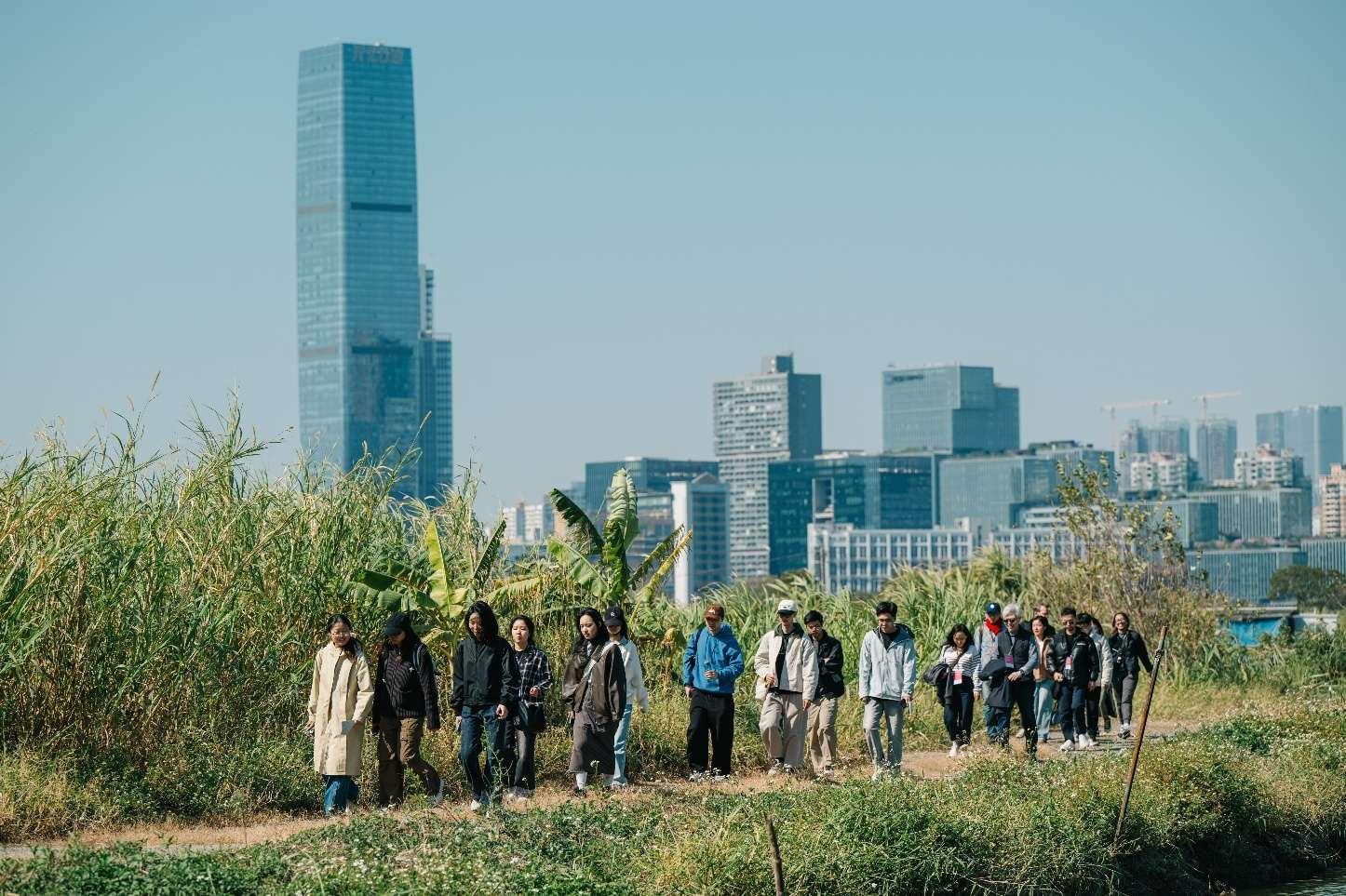MASTER OF ARTS IN URBAN DESIGN
MAUD Programme Handbook AY 25-26 Department of Architecture
National University of Singapore
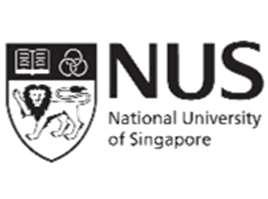
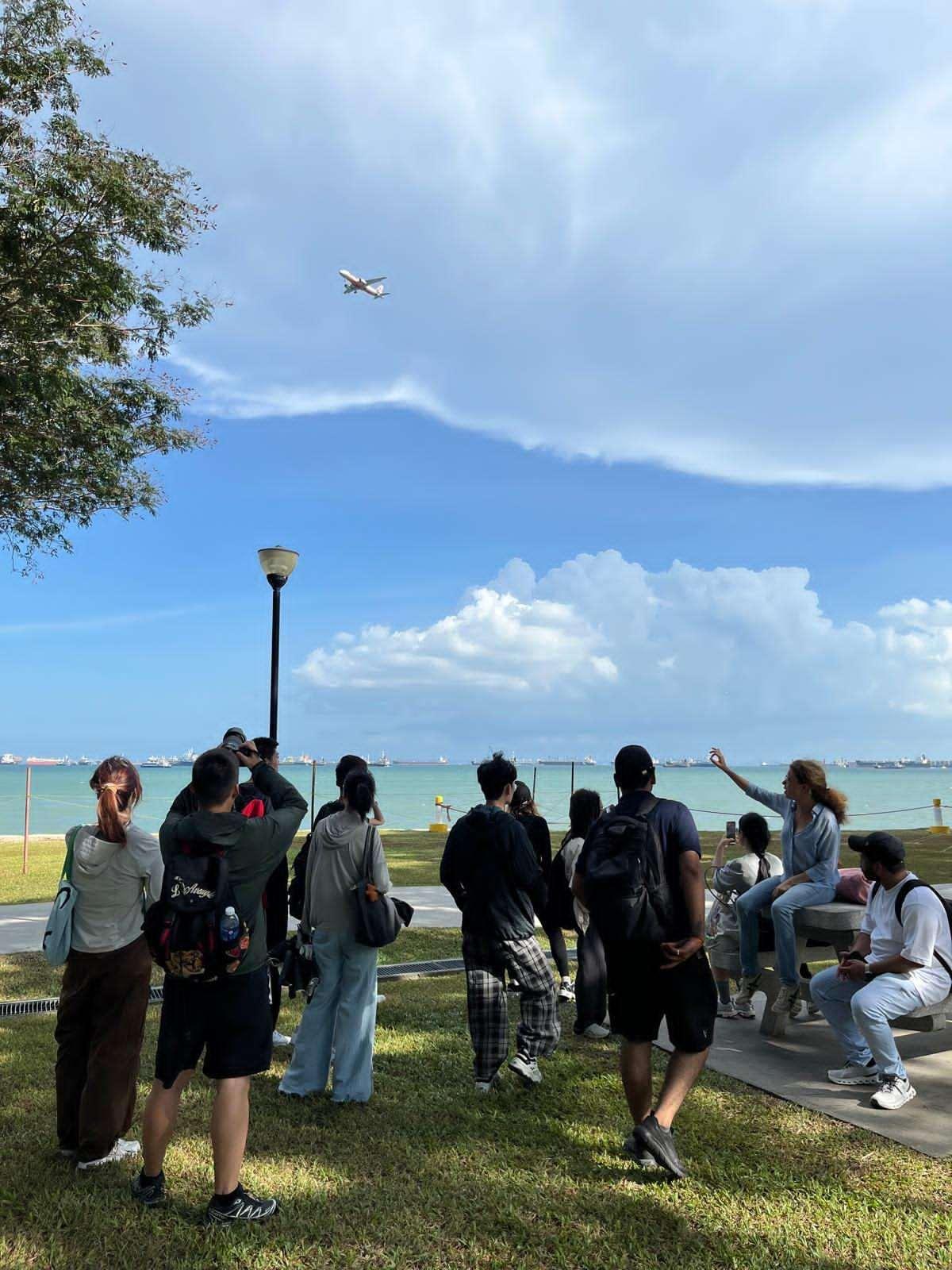

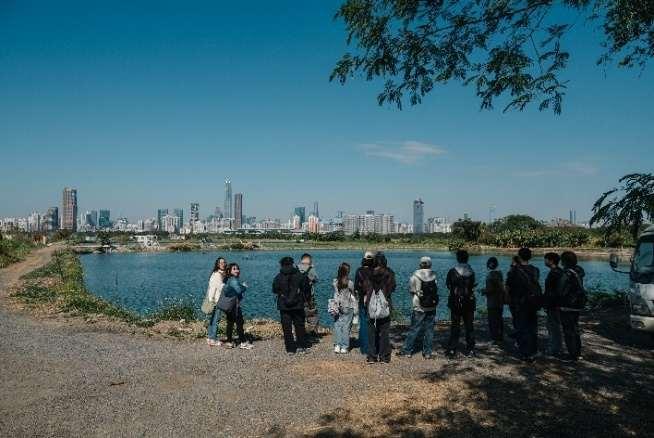

PROGRAMME OVERVIEW 4
PEDAGOGY AND CURRICULUM 5
COURSES AND INSTRUCTORS 6
TIMETABLE 7
COURSE DESCRIPTION 9
DISSERTATION 11
FIELDTRIPS 12
ASSESSMENT AND GRADUATION REQUIREMENTS 13
WRITING AND PLAGIARISM PREVENTION 15
CAREER PERSPECTIVES 16
PROGRAMME ADMINISTRATION 17
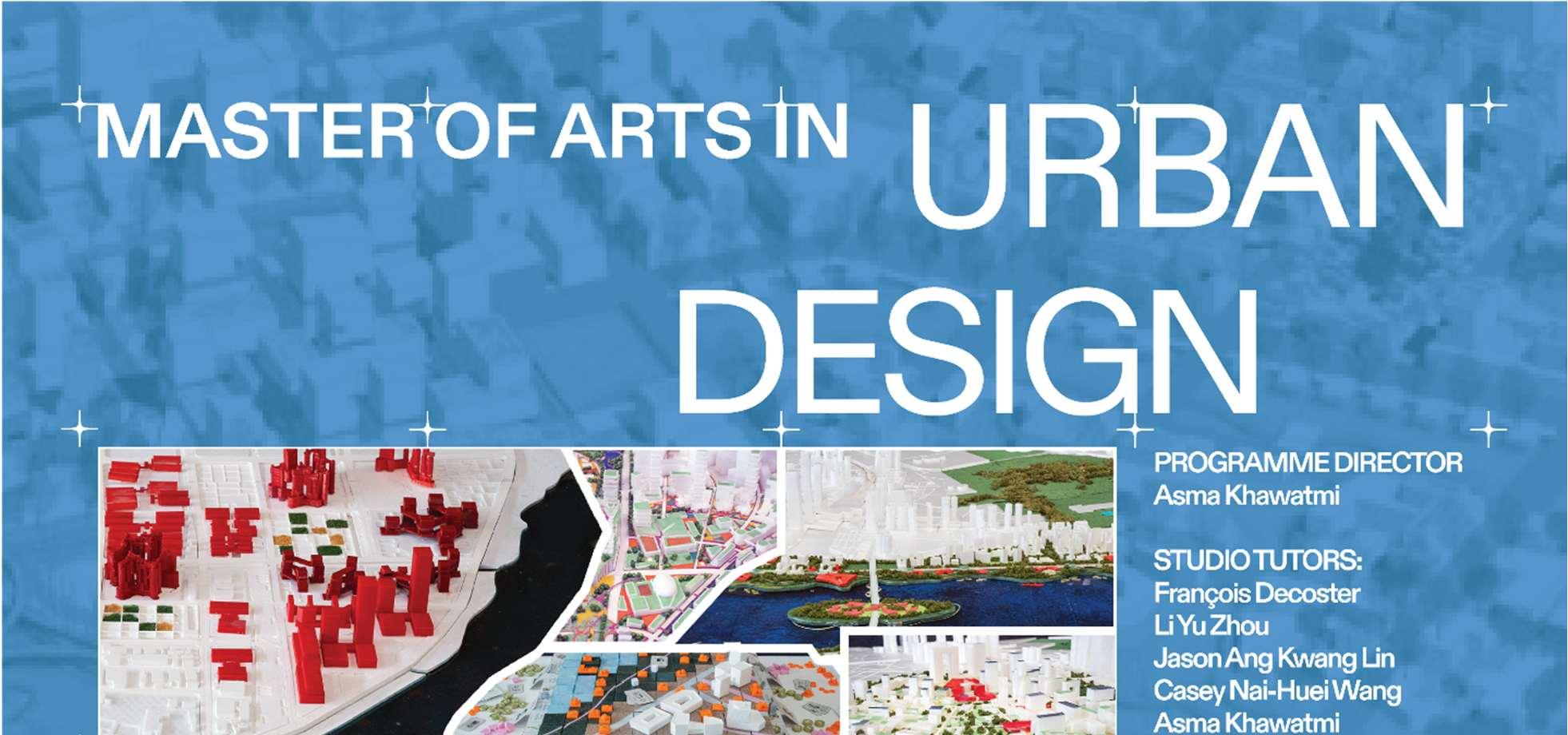
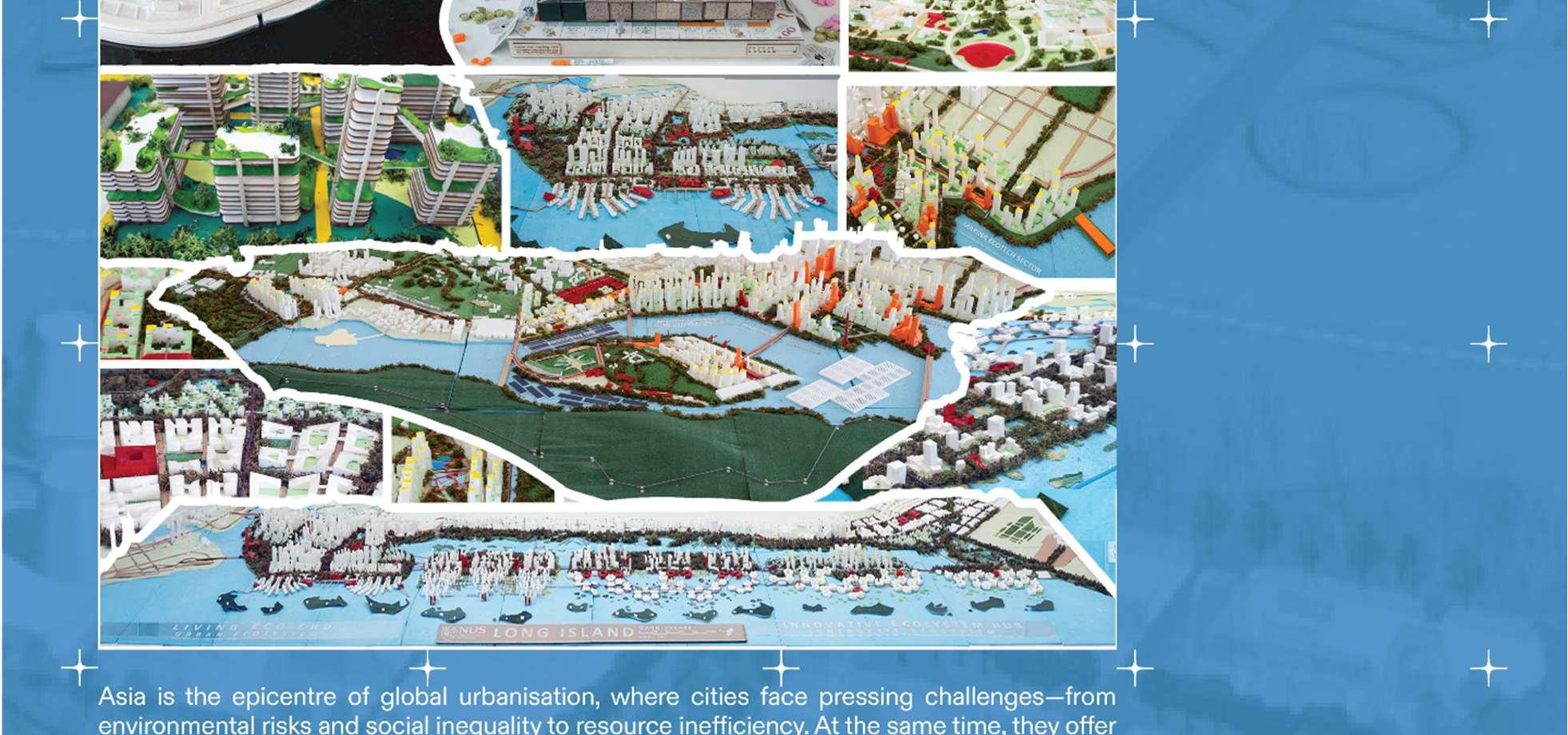
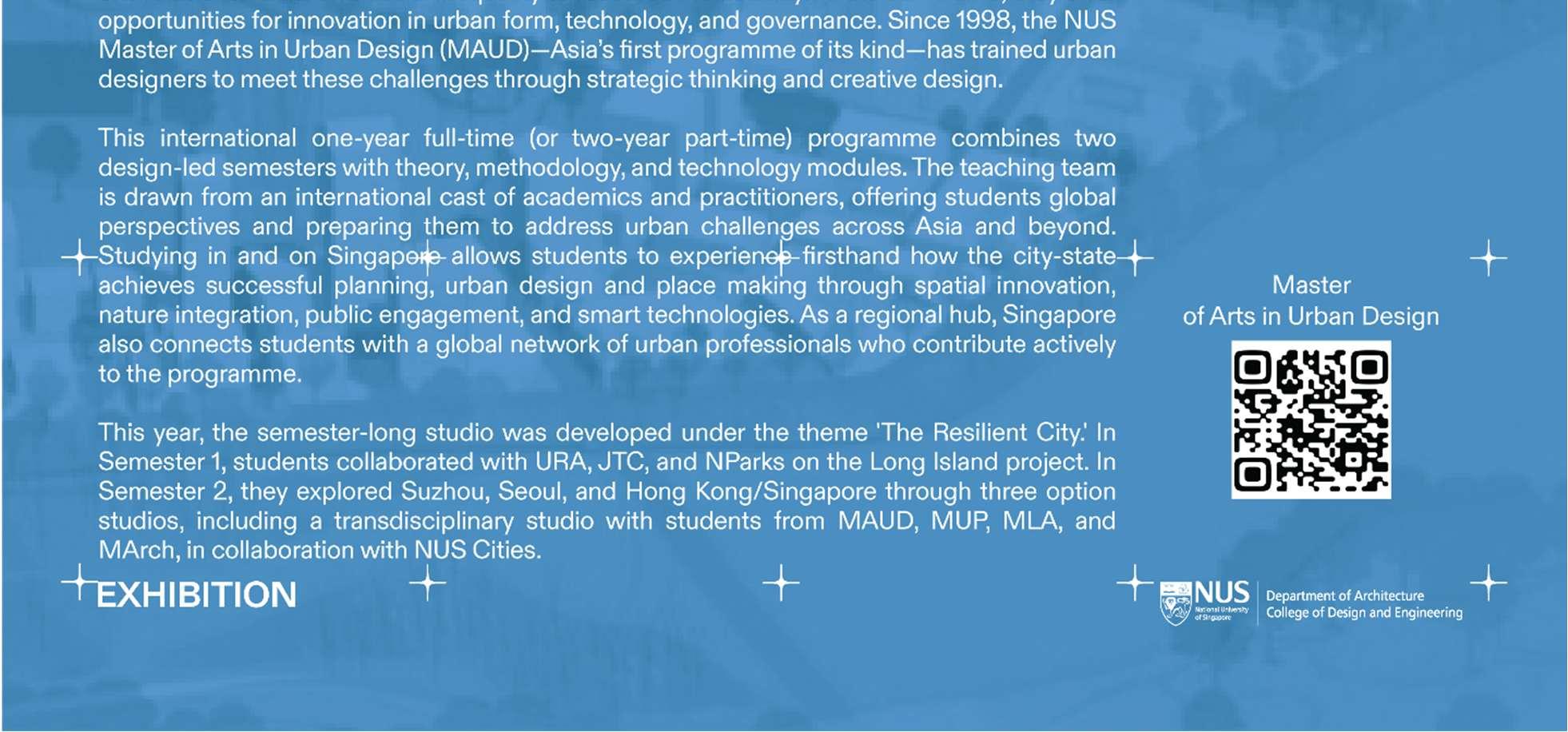
PROGRAMME OVERVIEW
NUS has been leading the urban design education in Asia since 1998, when the Master of Arts in Urban Design (MAUD) was established as the first-of-itskind programme in Asia. Over the past two decades, the MAUD programme has cultivated numerous leading urban designers with strategic visions and creative thinking skills for Asia and beyond. Today, in response to the fast-changing and increasingly complex urban realities, this programme provides students with an unparalleled learning opportunity, tapping into the experience of Singapore and cities in Asia as laboratories for design innovation and excellence. It aims to equip graduates with cuttingedge knowledge, social responsibility, entrepreneurial spirit, and all necessary skills to push forward the urban design profession in the rapidly urbanising world.
The learning of MAUD programme is organised around several key areas: 1) high-density urban environment and its physical structures and social conditions; 2) technological advancement and dataaugmented design; 3) social engagement and community development; and 4) systems thinking and collaboration in design.
The MAUD programme is a one-year full-time programme (two-year part-time). Its interdisciplinary curriculum is anchored by two urban design studios and a set of theory, methodology and technology courses. Students are able to participate in overseas field trips, internship attachments, and research activities to broaden their exposure and enrich their learning. This programme is uniquely positioned to leverage on Singapore’s experiences and its role as the central hub of the region and the world. It brings to students:
A global perspectives on Asian urban challenges
The teaching team of the MAUD programme is drawn from an international cast of experts from both academia and practice to provide students with global perspectives and help them become
future-ready urban designers to deal with challenges in and beyond Asia. Besides, Singapore as the regional hub for many multinational design and planning firms attracts numerous urban professionals around the world, who are also engaged in various ways to enhance the teaching and learning of this programme.
Singapore as a laboratory for high-density urbanism
Singapore is well-known for its outstanding achievements in high-density urbanism. It is the birthplace of many innovative urban design ideas that lead to the production of high-quality urban spaces across many cities. To study in and on Singapore is to live the city-state’s experience, witnessing how it creates new spatial configurations, incorporates natural resources, promotes public engagement, and harnesses smart technologies to achieve successful placemaking.
Broad exposure through varsity-industrygovernment partnerships
Understanding relations and creating synergies between different stakeholders can result in more constructive outcomes of urban design. The programme continuously engages practitioners and government officers in the teaching of different courses to deepen students’ learning through various lenses, and also to ground their studies on real-world challenges.
Collaborative learning to nurture leadership for greater cities
A defining character of urban design practice is collaboration across different knowledge boundaries and professional disciplines. Besides vocational knowledge, this programme places social and intellectual interdependence at the core of the education. It nurtures leadership skills in future urban designers for them to helm multiprofessional, multi-disciplinary collaboration with strong commitment to creating greater cities.
The MAUD curriculum aims to create an encompassing platform to consolidate students’ knowledge foundation and, more importantly, promote interdisciplinary collaborative learning. The courses are therefore designed to strike a balance between design studio and different aspects of urban design in terms of content, and between project-based and discussion-based
learning in terms of pedagogy. Many courses are shared with other programmes to provide students with an opportunity to work across disciplinary boundaries, socially negotiating knowledge with different peers. A diversity of practitioners and government officers are also engaged to provide students with wider exposures through seminar conversation and dissertation research.
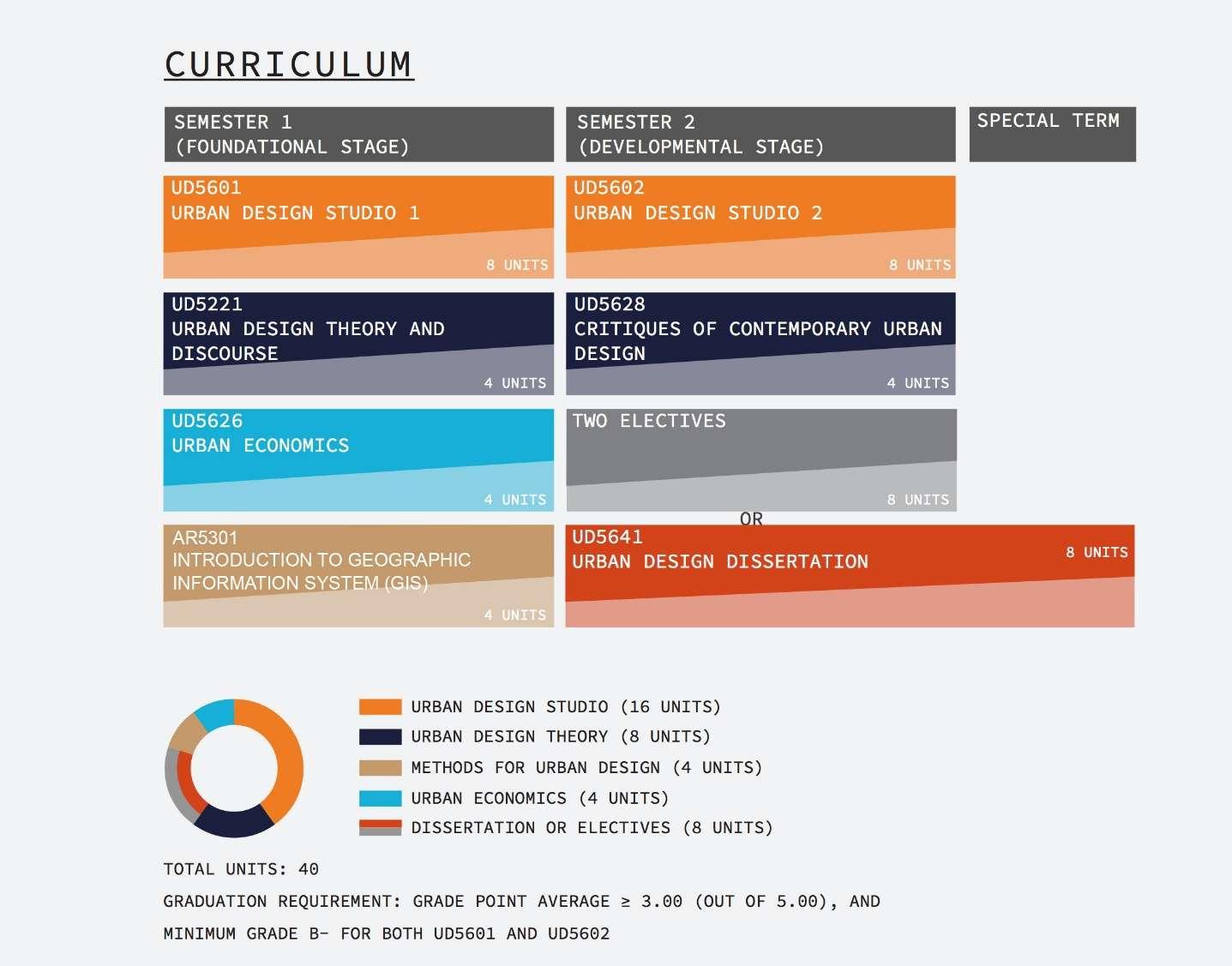
COURSES AND INSTRUCTORS
SEMESTER ONE
COURSE INSTRUCTOR
UD5601
URBAN DESIGN STUDIO 1
UD5221
URBAN DESIGN THEORY AND DISCOURSE
UD5625 METHODS AND TOOLS FOR URBAN DESIGN
UD5626
URBAN ECONOMICS
Ms. Asma KHAWATMI Associate Professor Studio coordinator
Mr. François DECOSTER Visiting Professor Founding Partner of I’AUC
Ms. Asma KHAWATMI Associate Professor
Dr. Jinda QI Assistant Professor
Dr. Yuming FU Associate Professor (Real Estate)
Ms. Sheau-Fong Wong Adjunct Associate Professor
Ms. Karen THAM Adjunct Associate Professor
Mr. Yann FOLLAIN Founding Partner WY-TO
SEMESTER TWO
COURSE INSTRUCTOR
UD5602
URBAN DESIGN STUDIO 2
UD5628 CRITIQUES OF CONTEMPORARY URBAN DESIGN
Ms. Asma KHAWATWI Associate Professor
Dr. Justin Stern Assistant Professor
Ms. Casey Nai-Huei WANG Visiting Senior Fellow
TWO ELECTIVES If Dissertation is not selected
Mr. Jason ANG Adjunct Associate Professor
UD5641
URBAN DESIGN DISSERTATION TBC
TIMETABLE
SEMESTER ONE
COURSE WEEK DAY TIME VENUE
UD5601 0-13 Monday, Thursday 9AM-1PM MAUD Studio, SDE1
UD5221 3-13 Tuesday 9AM-1PM Shared space, MAUD studio, SDE1
UD5625 1-13 Tuesday 2-6PM
UD5626 1-13 Wednesday 9AM-1PM
SEMESTER TWO
TBC
Please refer to NUS academic calendar: https://www.nus.edu.sg/registrar/calendar
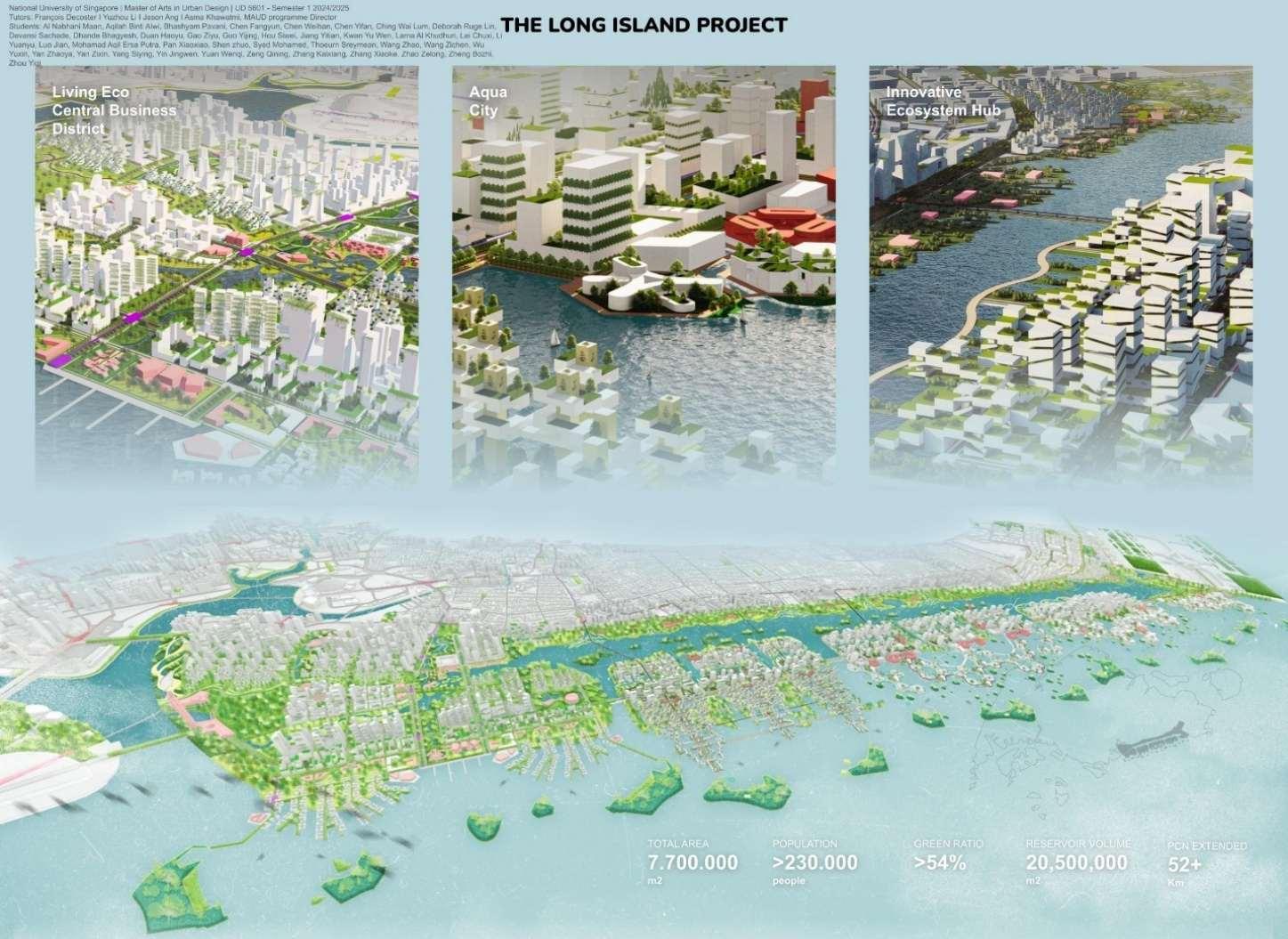
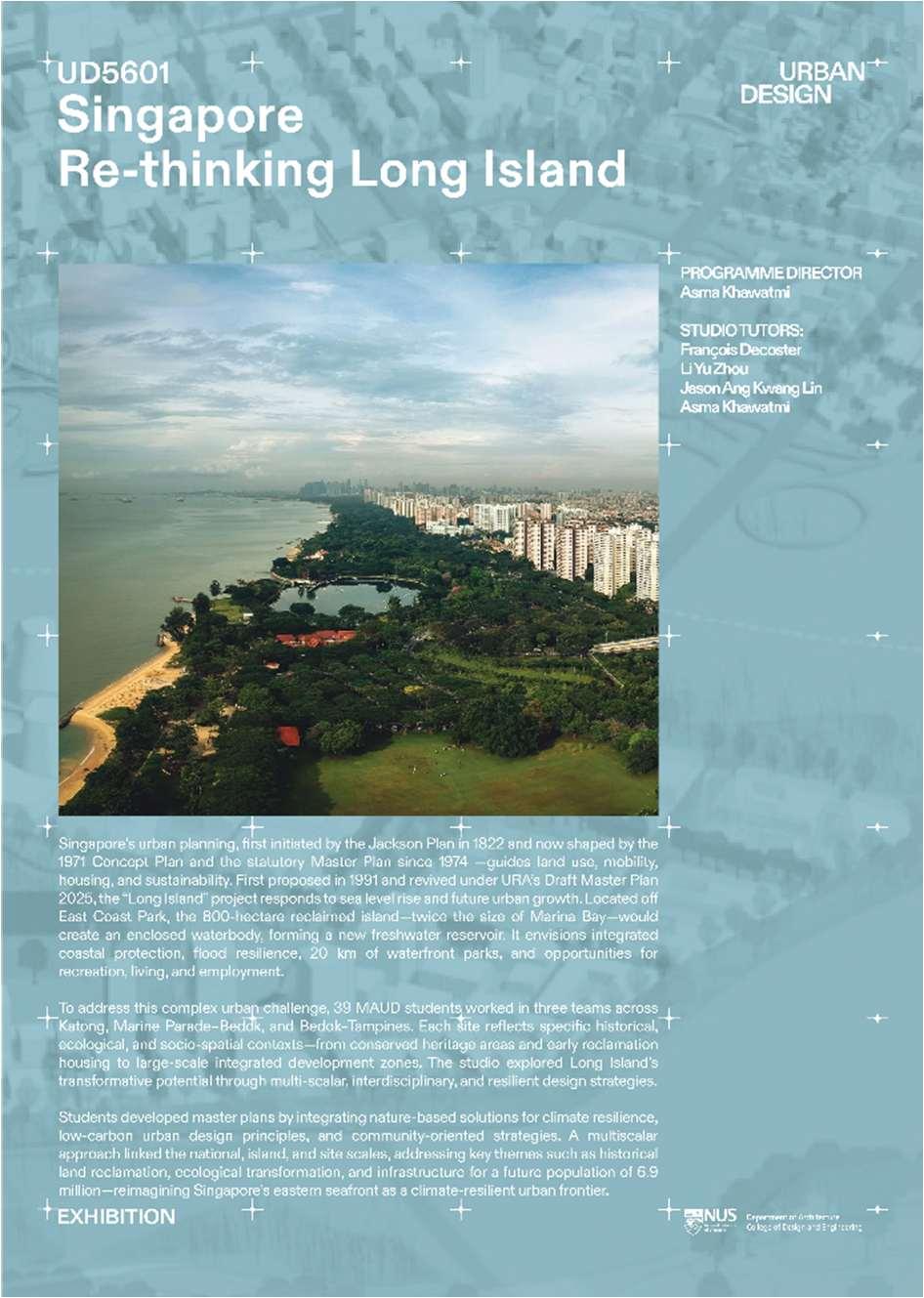
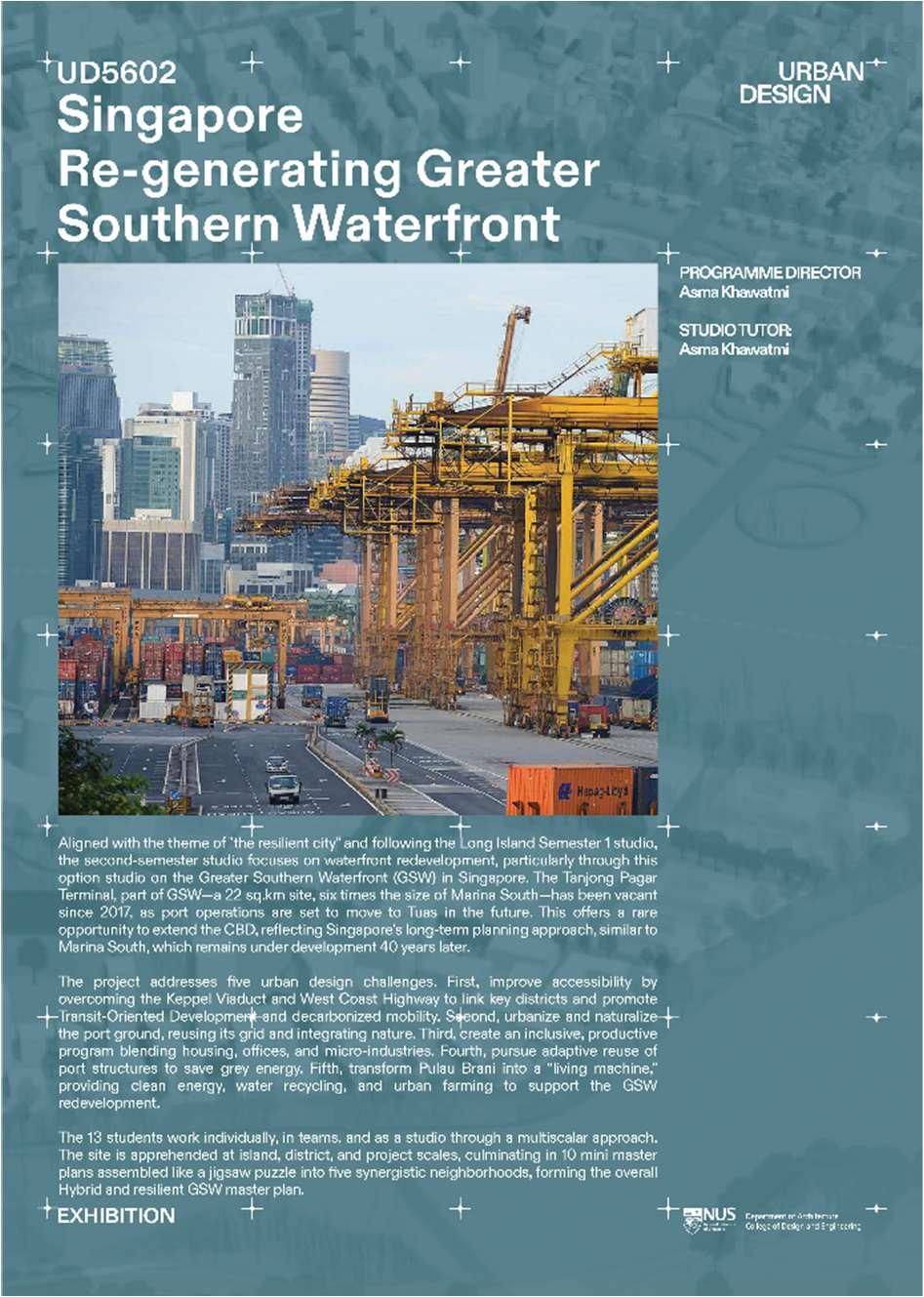
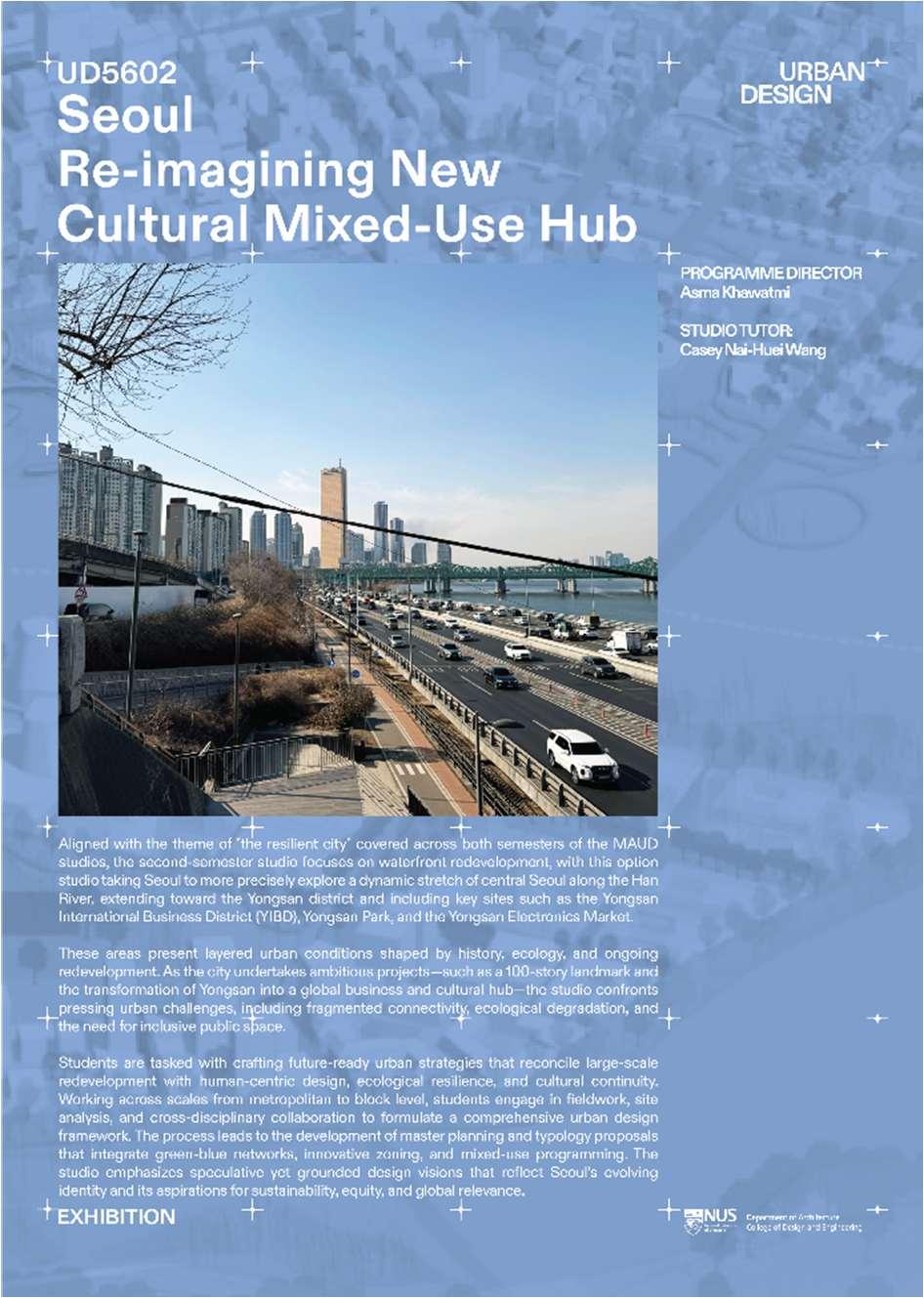
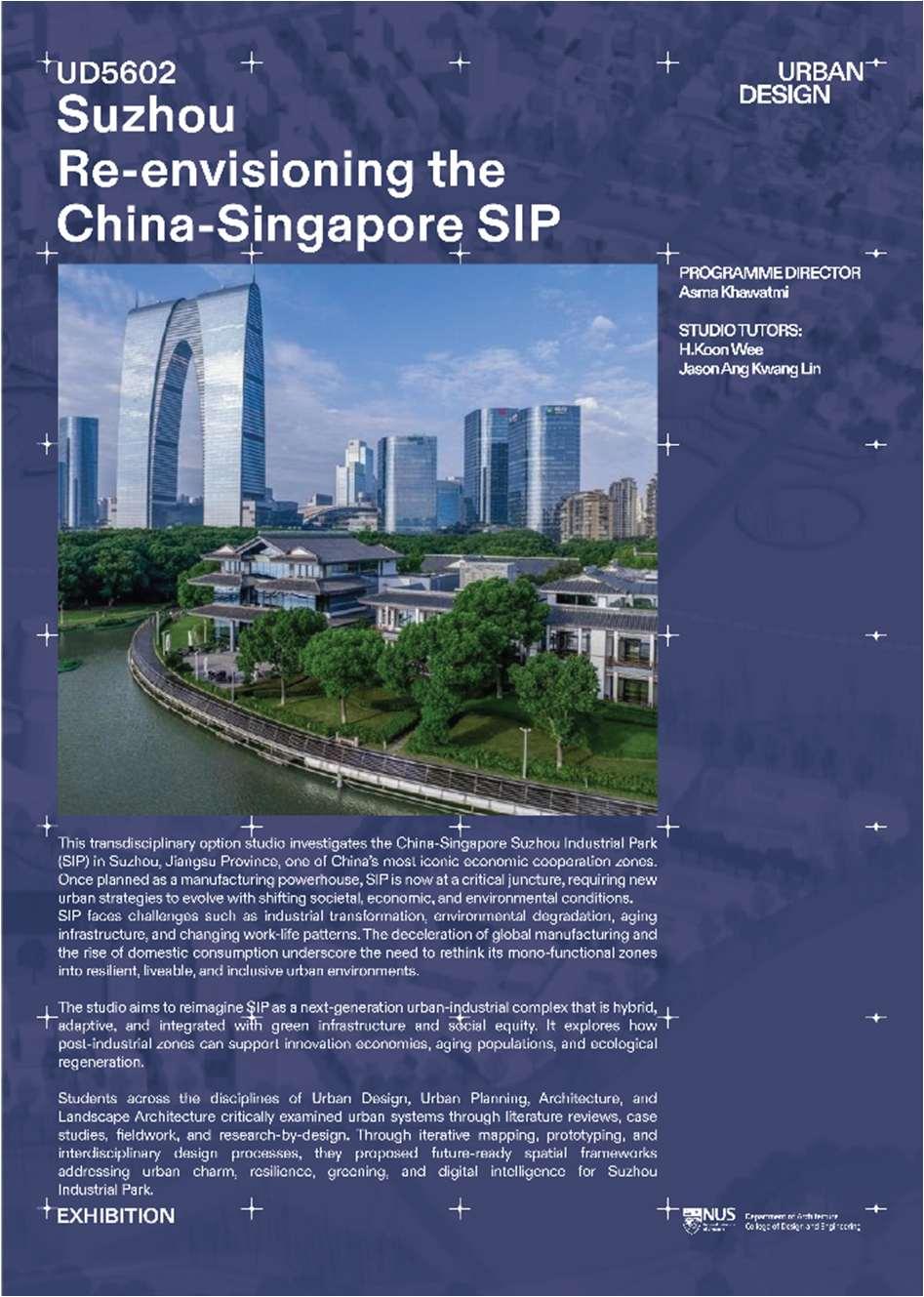
COURSE DESCRIPTION
UD5601 URBAN DESIGN STUDIO 1
The first urban design studio focuses on establishing a comprehensive understanding of urban design procedures. Following UD5622, the studio explores a deeper understanding on various urban systems (urban form, public space networks, transport/infrastructure networks, green/blue networks) and their synthesis. Students are expected to work in groups on all studio tasks. The studio is broken down into two stages – in the first stage, all groups propose different guide plans for an urban district; in the second stage, all groups are assigned with different sites for developing masterplan and urban design guidelines. Along with the design process, students are expected to conduct case studies, socioeconomic and geospatial analysis using knowledge from other courses. Instructors from other courses also engage in the studio’s review activities, in order to foster multi-level collaborative learning.
UD5602
URBAN DESIGN STUDIO 2
Building on the learning outcomes of Urban Design Studio 1, this course comprises three independent design studios, each aiming to tackle a contemporary urban challenge that is aligned with the studio leader’s expertise. Students are expected to work in groups, conducting systematic theoretical research, analysing urban design precedents, articulating urban design strategies, and developing fine-grained urban design schemes. Each studio usually includes a field trip to a city either within or beyond the region that is in line with the studio theme, allowing students to expand their horizons and gain experiences of working with local authorities and institutions (the field trip has been suspended during the Covid-19 pandemic).
UD5221 URBAN DESIGN THEORY AND DISCOURSE
Urban design is a discipline that focuses on the interaction of groups of buildings, streets and open spaces within a larger context. This introductory course will focus on some of the physical elements that impinge and influence urban design. The course aims to impart knowledge, understanding and analytical skills in urban design, through lectures, reading discussions, fieldwork and case studies analysis in order to develop the capacities of the students to: Describe city fabric and its material stocks, flows and their interdependencies; Understand the socio-economic drivers and
catalysts for urban design; Appreciate and evaluate the performance of city elements in time; and Formulate well-reasoned criteria for analysis and assessment of contemporary urban design conditions of varying scales, complexity and contexts.
UD5625 METHODS AND TOOLS FOR URBAN DESIGN
This course is intended for MSc in Real Estate and MAUD students and others at the Business School and the School of Design and Environment who aspire to learn about geographic information in the urban context and attain basic GIS skills. This interprogramme course has a multidisciplinary touch and much of it is focused on a variety of applications. The course focuses on urban problems, but the generic skills you develop in this course will be useful for a wide range of data, and give you a solid foundation to explore particular and focused problems. This course is composed of lectures, demos, tutorials, readings and range of assignments, providing hands-on the state of the art tools, datasets, and methods to manipulate, analyse, and visualise geospatial data. Upon completion of the course, students will be able to: Start thinking about data spatially; Collect appropriate geospatial data and assess its suitability; Use QGIS, one of the most widely used GIS software packages; Conduct data processing and spatial analysis; Portray the results in an effective way; Be critical with maps and spatial analyses; Use the attained knowledge and skills in their studies and career.
UD5626 URBAN ECONOMICS
This course is a shared course between MAUD and MUP programmes. It explains the economic forces that shape urban development and create a multitude of urban challenges we face today. It aims to provide a holistic framework for evaluating urban planning and design interventions devised to tackle these challenges. After reviewing the relevant fundamental economic forces, the course examines urban challenges arising from disruptive technologies and the governance gaps in globalization that threaten economic inclusiveness and environmental sustainability. It further examines citymaking visions to tackle these challenges and the creation of public resources and private incentives for realizing these visions.
This course aims to help students develop a critical understanding of emerging urban challenges through assessing a series of contemporary urban design projects. In the face of accelerating technological advancement, exacerbating environmental degradation, and in particular unexpected threats such as the Covid-19 pandemic,
our cities are confronted with many emerging challenges. This requires us to reflect on and reconceptualise urban design practice. By examining the latest debates and discussions, and through conversations with experts from practices, government agencies, and academia, this course will provide students with a multi-perspective platform for them to develop their own critical views and convictions of urban design.
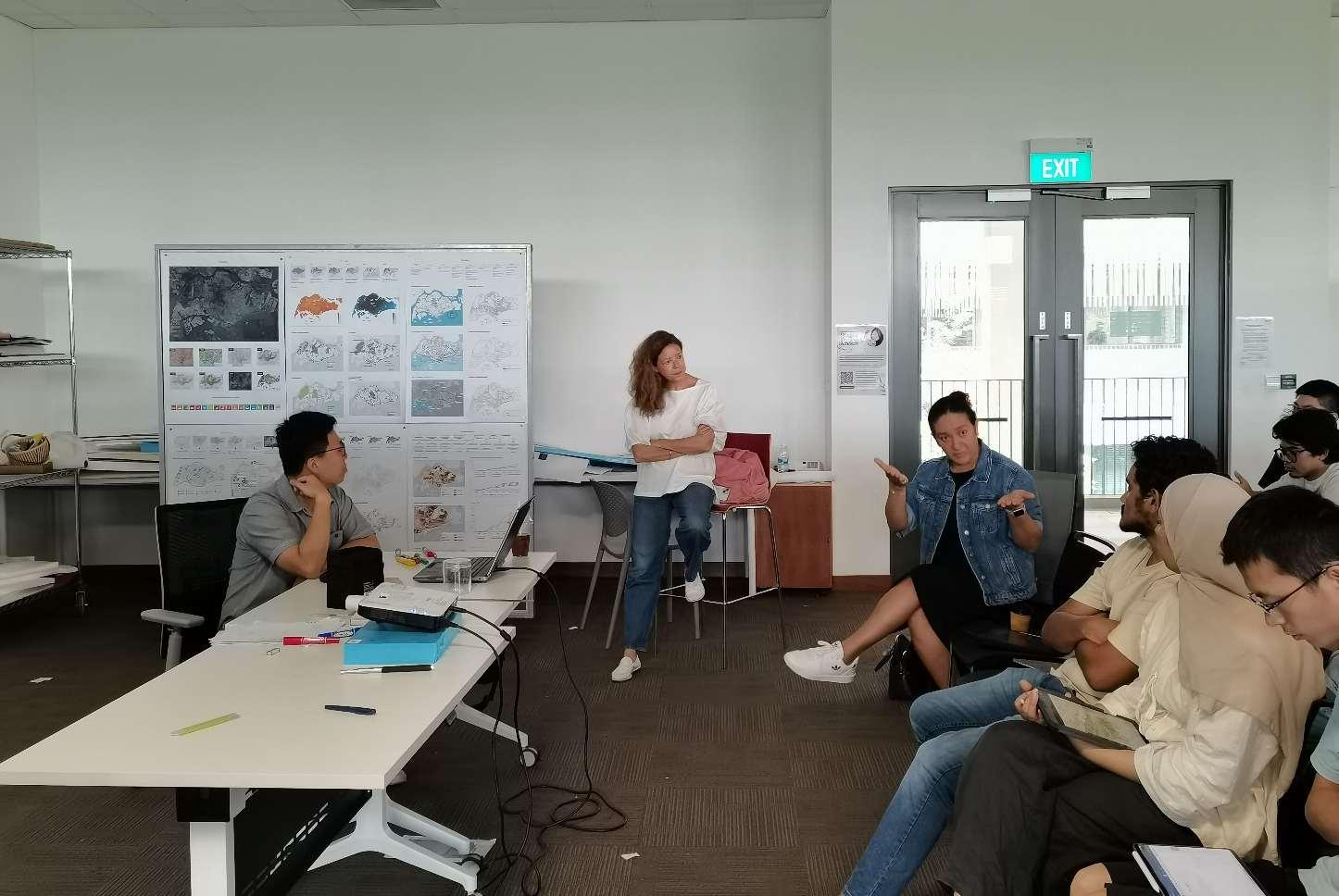
DISSERTATION
UD5641 Dissertation is a research-intensive course for MAUD students that enables conducting an independent research project during their study under the supervision of a research-active faculty member with expertise in a related domain.
The key objectives of the dissertation course are to provide an opportunity to the student to understand how to conduct scientific research and to deepen their expertise in a particular topic of interest. The course is flexible, it allows freedom in exploring own interests, and it is predominantly individual. The main deliverable is a research report to be submitted at the end of their studies. The dissertation course is conducted primarily between the student and supervisor, with sporadic contact with the coordinator, other academic staff, and other students. It is important to highlight that the dissertation is an independent study, thus, a student will undertake a higher degree of independence than usual.
The key components of this course are:
Literature review: getting familiar with the state of the art of a relevant topic.
Conceptusalisation of research: defining a research question/topic/objective.
Exploration (performing preliminary experiments to assess the feasibility of the topic).
Designing a sound research methodology.
Conducting research/experiments.
Presentation of the work (in-class presentation and writing a report).
Understanding potential for future work and further applications.
The results of this course may serve as a foundation for further research or for publication in an external outlet, e.g. conference or journal.
The dissertation is not a course during doctoral studies, so cutting edge research or advanced originality is not expected as it is at the PhD level, but a degree of novelty and quality at the graduate level of a research university is required. This course is also for those who are interested in pursuing PhDs to better prepare themselves.
Besides the student, the dissertation includes the supervisor, co-reader, and coordinator.
Supervisor
Each dissertation must have a supervisor. The supervisor is responsible for the overall project from early discussions to the final submission, and he/she is involved in all the steps of the process. A supervisor may be a faculty member who is domain expert in a particular topic.
Co-reader
The co-reader serves as the second examiner of the dissertation (besides the supervisor) at the final stage of the course. The co-reader may not be involved in the research to ensure the objectivity of assessment. A co-reader is arranged by the coordinator, but input from the student and supervisor may be considered in certain circumstances.
Coordinator
The coordinator manages the organisation and execution of the course, and administrative matters. Students are welcome to contact the coordinator for queries before and during this course.
Most of the contact is directly between the student and supervisor (and optionally, co-supervisor) through periodic progress meetings. The schedule will be discussed between the student and supervisor. Weekly contact (if not meetings, then at least a brief status update) is encouraged, but no more than two weeks should pass between consecutive discussions.
During the semester, we will meet twice as a cohort: Introduction to the course with some tips (in the first few weeks); Midterm review (This session is to solicit feedback, check on the progress, and have an opportunity to consolidate thoughts and writing. It plays no role in the marking. The presence of the supervisor is necessary).
There is no final thesis defense. The only final deliverable is the report.
FIELDTRIPS
The MAUD programme aims to enhance students’ learning by broadening their exposure to different urban environments and professional practices. The field trip takes students to cities within or beyond the region for 7 to 10 days, learning about
urban design practice in the local contexts. Students will be able to interact with scholars, practitioners, and government officers to gain insights on the practice, and to explore the cities to observe and experience the urban spaces.
